Detailed Report on Al-Katab v Godwin: Migration Act and Legal Theories
VerifiedAdded on 2020/12/09
|13
|3662
|192
Report
AI Summary
This report provides a comprehensive analysis of the Al-Katab v Godwin case, which involved the interpretation of the Migration Act 1958 in Australia, specifically sections 189, 196, and 198, concerning the detention of unlawful non-citizens. The case revolved around Ahmed Ali Al-Katab, a stateless person, and the legality of his indefinite detention. The report explores the facts of the case, the legal arguments presented, and the High Court's decision, which upheld the indefinite detention. It examines the application of legal theories, particularly legal positivism as advocated by Justice Hayne, and contrasts it with other interpretations. The report delves into the ambiguity surrounding statutory interpretation and the impact of the court's decision on the rights of detainees and the powers of the immigration department, highlighting the differing views of the justices and the implications for immigration law.
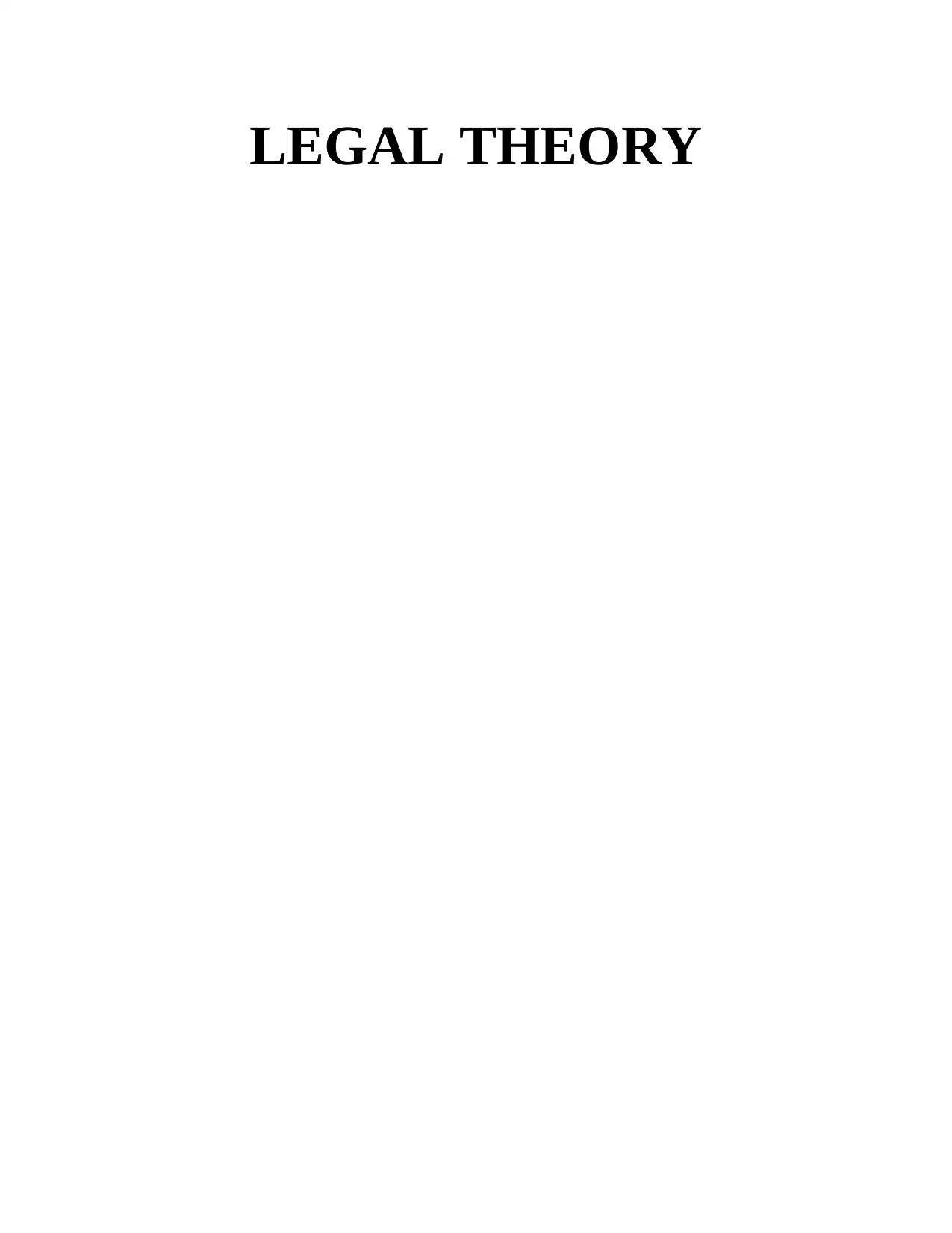
LEGAL THEORY
Paraphrase This Document
Need a fresh take? Get an instant paraphrase of this document with our AI Paraphraser
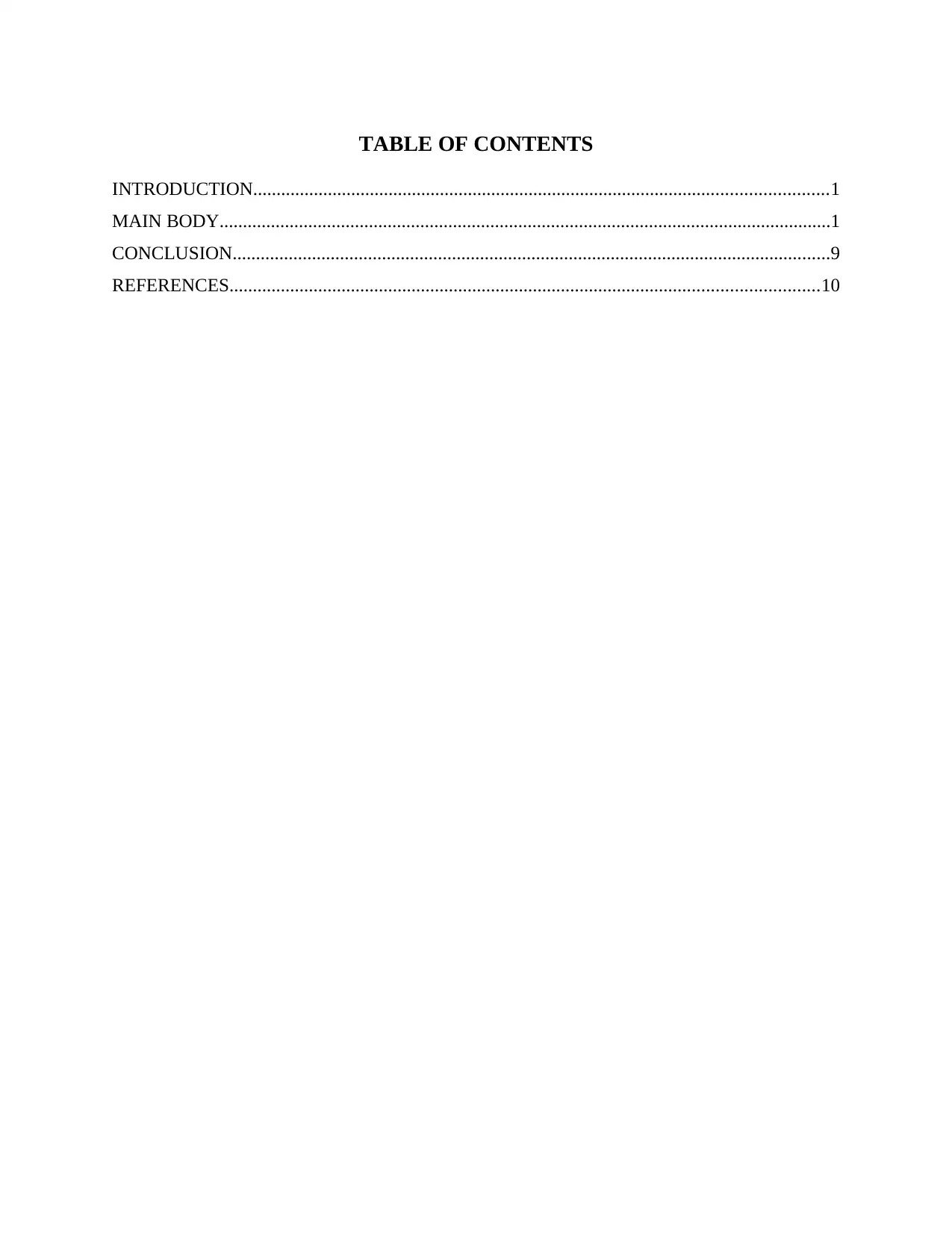
TABLE OF CONTENTS
INTRODUCTION...........................................................................................................................1
MAIN BODY...................................................................................................................................1
CONCLUSION................................................................................................................................9
REFERENCES..............................................................................................................................10
INTRODUCTION...........................................................................................................................1
MAIN BODY...................................................................................................................................1
CONCLUSION................................................................................................................................9
REFERENCES..............................................................................................................................10
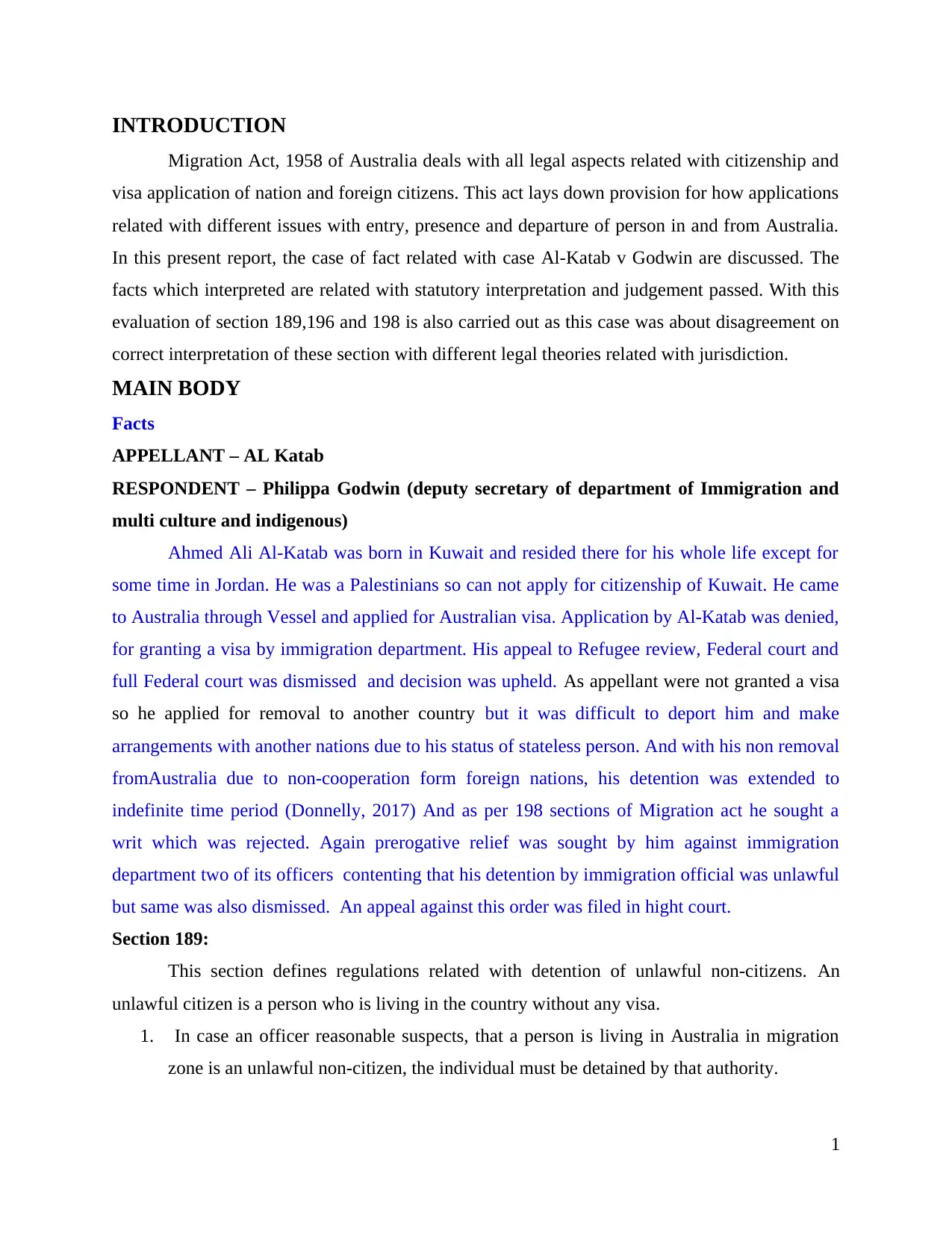
INTRODUCTION
Migration Act, 1958 of Australia deals with all legal aspects related with citizenship and
visa application of nation and foreign citizens. This act lays down provision for how applications
related with different issues with entry, presence and departure of person in and from Australia.
In this present report, the case of fact related with case Al-Katab v Godwin are discussed. The
facts which interpreted are related with statutory interpretation and judgement passed. With this
evaluation of section 189,196 and 198 is also carried out as this case was about disagreement on
correct interpretation of these section with different legal theories related with jurisdiction.
MAIN BODY
Facts
APPELLANT – AL Katab
RESPONDENT – Philippa Godwin (deputy secretary of department of Immigration and
multi culture and indigenous)
Ahmed Ali Al-Katab was born in Kuwait and resided there for his whole life except for
some time in Jordan. He was a Palestinians so can not apply for citizenship of Kuwait. He came
to Australia through Vessel and applied for Australian visa. Application by Al-Katab was denied,
for granting a visa by immigration department. His appeal to Refugee review, Federal court and
full Federal court was dismissed and decision was upheld. As appellant were not granted a visa
so he applied for removal to another country but it was difficult to deport him and make
arrangements with another nations due to his status of stateless person. And with his non removal
fromAustralia due to non-cooperation form foreign nations, his detention was extended to
indefinite time period (Donnelly, 2017) And as per 198 sections of Migration act he sought a
writ which was rejected. Again prerogative relief was sought by him against immigration
department two of its officers contenting that his detention by immigration official was unlawful
but same was also dismissed. An appeal against this order was filed in hight court.
Section 189:
This section defines regulations related with detention of unlawful non-citizens. An
unlawful citizen is a person who is living in the country without any visa.
1. In case an officer reasonable suspects, that a person is living in Australia in migration
zone is an unlawful non-citizen, the individual must be detained by that authority.
1
Migration Act, 1958 of Australia deals with all legal aspects related with citizenship and
visa application of nation and foreign citizens. This act lays down provision for how applications
related with different issues with entry, presence and departure of person in and from Australia.
In this present report, the case of fact related with case Al-Katab v Godwin are discussed. The
facts which interpreted are related with statutory interpretation and judgement passed. With this
evaluation of section 189,196 and 198 is also carried out as this case was about disagreement on
correct interpretation of these section with different legal theories related with jurisdiction.
MAIN BODY
Facts
APPELLANT – AL Katab
RESPONDENT – Philippa Godwin (deputy secretary of department of Immigration and
multi culture and indigenous)
Ahmed Ali Al-Katab was born in Kuwait and resided there for his whole life except for
some time in Jordan. He was a Palestinians so can not apply for citizenship of Kuwait. He came
to Australia through Vessel and applied for Australian visa. Application by Al-Katab was denied,
for granting a visa by immigration department. His appeal to Refugee review, Federal court and
full Federal court was dismissed and decision was upheld. As appellant were not granted a visa
so he applied for removal to another country but it was difficult to deport him and make
arrangements with another nations due to his status of stateless person. And with his non removal
fromAustralia due to non-cooperation form foreign nations, his detention was extended to
indefinite time period (Donnelly, 2017) And as per 198 sections of Migration act he sought a
writ which was rejected. Again prerogative relief was sought by him against immigration
department two of its officers contenting that his detention by immigration official was unlawful
but same was also dismissed. An appeal against this order was filed in hight court.
Section 189:
This section defines regulations related with detention of unlawful non-citizens. An
unlawful citizen is a person who is living in the country without any visa.
1. In case an officer reasonable suspects, that a person is living in Australia in migration
zone is an unlawful non-citizen, the individual must be detained by that authority.
1
⊘ This is a preview!⊘
Do you want full access?
Subscribe today to unlock all pages.

Trusted by 1+ million students worldwide
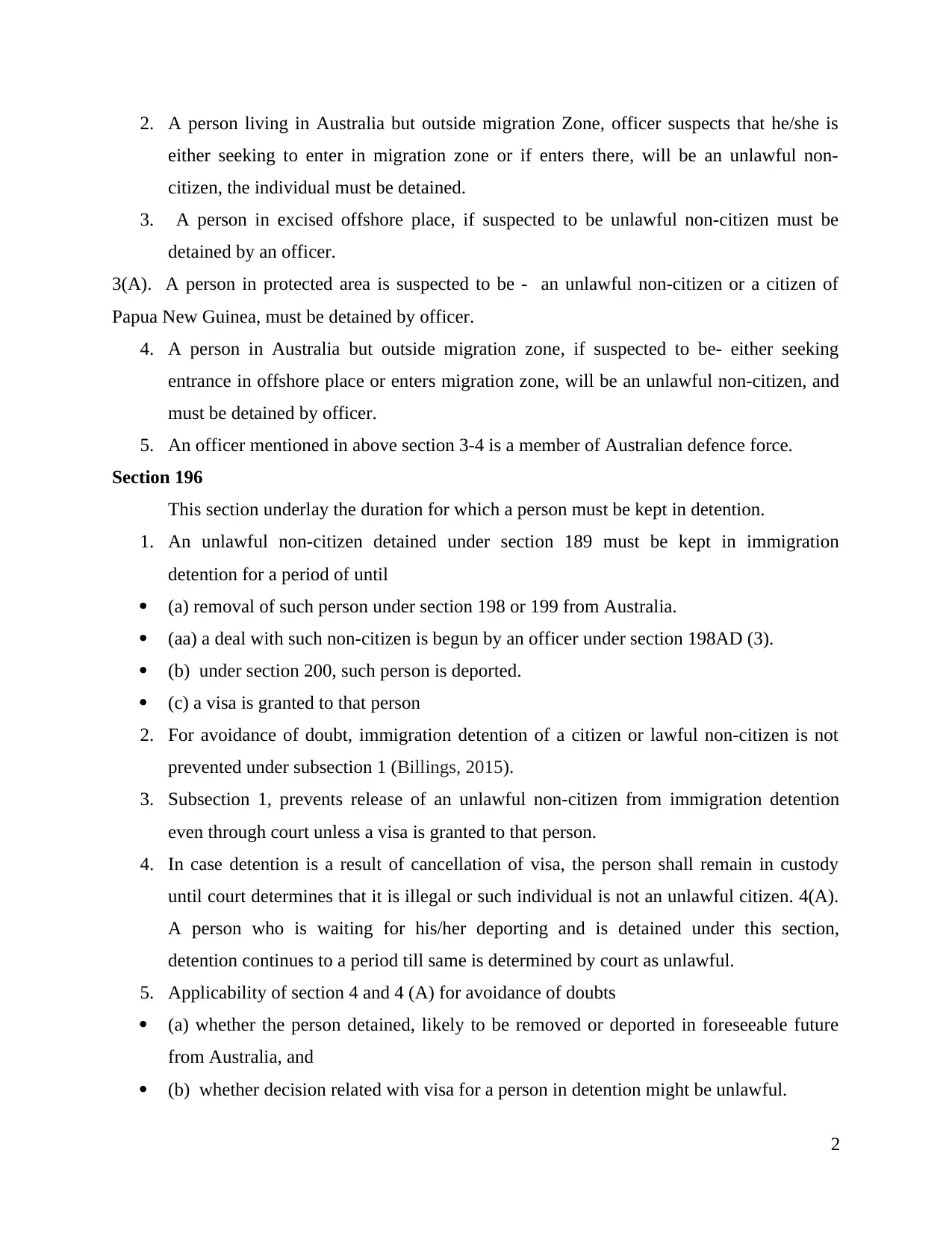
2. A person living in Australia but outside migration Zone, officer suspects that he/she is
either seeking to enter in migration zone or if enters there, will be an unlawful non-
citizen, the individual must be detained.
3. A person in excised offshore place, if suspected to be unlawful non-citizen must be
detained by an officer.
3(A). A person in protected area is suspected to be - an unlawful non-citizen or a citizen of
Papua New Guinea, must be detained by officer.
4. A person in Australia but outside migration zone, if suspected to be- either seeking
entrance in offshore place or enters migration zone, will be an unlawful non-citizen, and
must be detained by officer.
5. An officer mentioned in above section 3-4 is a member of Australian defence force.
Section 196
This section underlay the duration for which a person must be kept in detention.
1. An unlawful non-citizen detained under section 189 must be kept in immigration
detention for a period of until
(a) removal of such person under section 198 or 199 from Australia.
(aa) a deal with such non-citizen is begun by an officer under section 198AD (3).
(b) under section 200, such person is deported.
(c) a visa is granted to that person
2. For avoidance of doubt, immigration detention of a citizen or lawful non-citizen is not
prevented under subsection 1 (Billings, 2015).
3. Subsection 1, prevents release of an unlawful non-citizen from immigration detention
even through court unless a visa is granted to that person.
4. In case detention is a result of cancellation of visa, the person shall remain in custody
until court determines that it is illegal or such individual is not an unlawful citizen. 4(A).
A person who is waiting for his/her deporting and is detained under this section,
detention continues to a period till same is determined by court as unlawful.
5. Applicability of section 4 and 4 (A) for avoidance of doubts
(a) whether the person detained, likely to be removed or deported in foreseeable future
from Australia, and
(b) whether decision related with visa for a person in detention might be unlawful.
2
either seeking to enter in migration zone or if enters there, will be an unlawful non-
citizen, the individual must be detained.
3. A person in excised offshore place, if suspected to be unlawful non-citizen must be
detained by an officer.
3(A). A person in protected area is suspected to be - an unlawful non-citizen or a citizen of
Papua New Guinea, must be detained by officer.
4. A person in Australia but outside migration zone, if suspected to be- either seeking
entrance in offshore place or enters migration zone, will be an unlawful non-citizen, and
must be detained by officer.
5. An officer mentioned in above section 3-4 is a member of Australian defence force.
Section 196
This section underlay the duration for which a person must be kept in detention.
1. An unlawful non-citizen detained under section 189 must be kept in immigration
detention for a period of until
(a) removal of such person under section 198 or 199 from Australia.
(aa) a deal with such non-citizen is begun by an officer under section 198AD (3).
(b) under section 200, such person is deported.
(c) a visa is granted to that person
2. For avoidance of doubt, immigration detention of a citizen or lawful non-citizen is not
prevented under subsection 1 (Billings, 2015).
3. Subsection 1, prevents release of an unlawful non-citizen from immigration detention
even through court unless a visa is granted to that person.
4. In case detention is a result of cancellation of visa, the person shall remain in custody
until court determines that it is illegal or such individual is not an unlawful citizen. 4(A).
A person who is waiting for his/her deporting and is detained under this section,
detention continues to a period till same is determined by court as unlawful.
5. Applicability of section 4 and 4 (A) for avoidance of doubts
(a) whether the person detained, likely to be removed or deported in foreseeable future
from Australia, and
(b) whether decision related with visa for a person in detention might be unlawful.
2
Paraphrase This Document
Need a fresh take? Get an instant paraphrase of this document with our AI Paraphraser
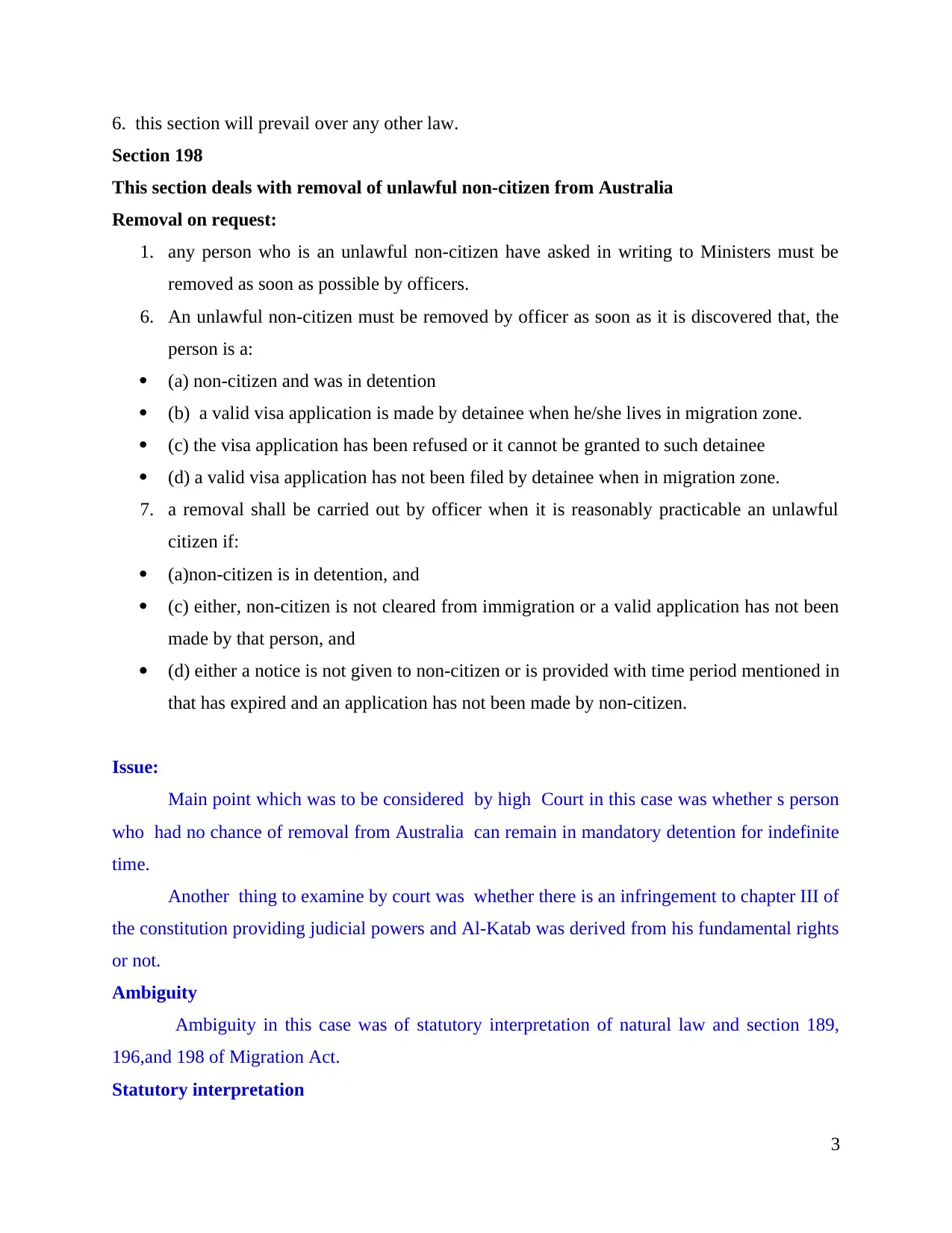
6. this section will prevail over any other law.
Section 198
This section deals with removal of unlawful non-citizen from Australia
Removal on request:
1. any person who is an unlawful non-citizen have asked in writing to Ministers must be
removed as soon as possible by officers.
6. An unlawful non-citizen must be removed by officer as soon as it is discovered that, the
person is a:
(a) non-citizen and was in detention
(b) a valid visa application is made by detainee when he/she lives in migration zone.
(c) the visa application has been refused or it cannot be granted to such detainee
(d) a valid visa application has not been filed by detainee when in migration zone.
7. a removal shall be carried out by officer when it is reasonably practicable an unlawful
citizen if:
(a)non-citizen is in detention, and
(c) either, non-citizen is not cleared from immigration or a valid application has not been
made by that person, and
(d) either a notice is not given to non-citizen or is provided with time period mentioned in
that has expired and an application has not been made by non-citizen.
Issue:
Main point which was to be considered by high Court in this case was whether s person
who had no chance of removal from Australia can remain in mandatory detention for indefinite
time.
Another thing to examine by court was whether there is an infringement to chapter III of
the constitution providing judicial powers and Al-Katab was derived from his fundamental rights
or not.
Ambiguity
Ambiguity in this case was of statutory interpretation of natural law and section 189,
196,and 198 of Migration Act.
Statutory interpretation
3
Section 198
This section deals with removal of unlawful non-citizen from Australia
Removal on request:
1. any person who is an unlawful non-citizen have asked in writing to Ministers must be
removed as soon as possible by officers.
6. An unlawful non-citizen must be removed by officer as soon as it is discovered that, the
person is a:
(a) non-citizen and was in detention
(b) a valid visa application is made by detainee when he/she lives in migration zone.
(c) the visa application has been refused or it cannot be granted to such detainee
(d) a valid visa application has not been filed by detainee when in migration zone.
7. a removal shall be carried out by officer when it is reasonably practicable an unlawful
citizen if:
(a)non-citizen is in detention, and
(c) either, non-citizen is not cleared from immigration or a valid application has not been
made by that person, and
(d) either a notice is not given to non-citizen or is provided with time period mentioned in
that has expired and an application has not been made by non-citizen.
Issue:
Main point which was to be considered by high Court in this case was whether s person
who had no chance of removal from Australia can remain in mandatory detention for indefinite
time.
Another thing to examine by court was whether there is an infringement to chapter III of
the constitution providing judicial powers and Al-Katab was derived from his fundamental rights
or not.
Ambiguity
Ambiguity in this case was of statutory interpretation of natural law and section 189,
196,and 198 of Migration Act.
Statutory interpretation
3
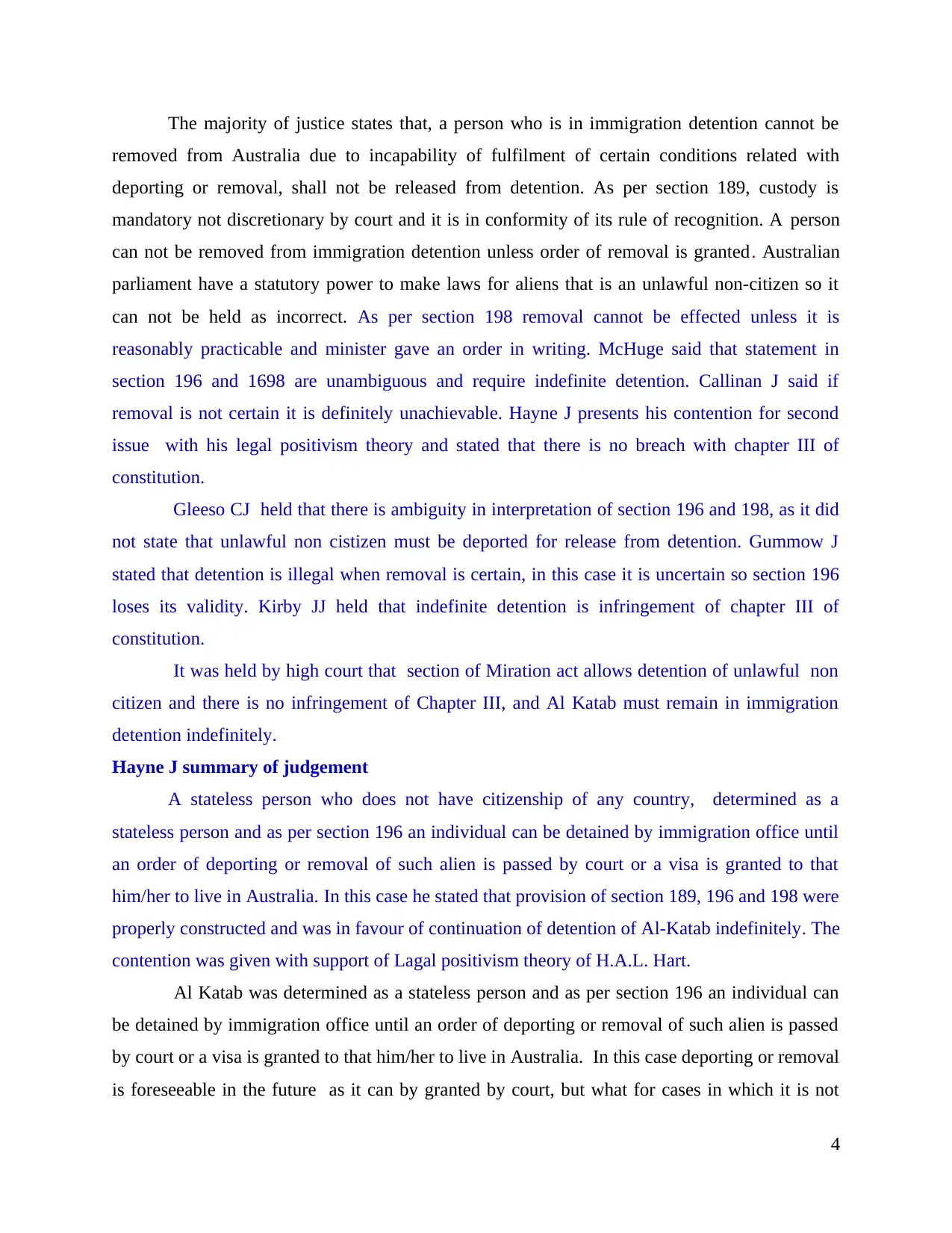
The majority of justice states that, a person who is in immigration detention cannot be
removed from Australia due to incapability of fulfilment of certain conditions related with
deporting or removal, shall not be released from detention. As per section 189, custody is
mandatory not discretionary by court and it is in conformity of its rule of recognition. A person
can not be removed from immigration detention unless order of removal is granted. Australian
parliament have a statutory power to make laws for aliens that is an unlawful non-citizen so it
can not be held as incorrect. As per section 198 removal cannot be effected unless it is
reasonably practicable and minister gave an order in writing. McHuge said that statement in
section 196 and 1698 are unambiguous and require indefinite detention. Callinan J said if
removal is not certain it is definitely unachievable. Hayne J presents his contention for second
issue with his legal positivism theory and stated that there is no breach with chapter III of
constitution.
Gleeso CJ held that there is ambiguity in interpretation of section 196 and 198, as it did
not state that unlawful non cistizen must be deported for release from detention. Gummow J
stated that detention is illegal when removal is certain, in this case it is uncertain so section 196
loses its validity. Kirby JJ held that indefinite detention is infringement of chapter III of
constitution.
It was held by high court that section of Miration act allows detention of unlawful non
citizen and there is no infringement of Chapter III, and Al Katab must remain in immigration
detention indefinitely.
Hayne J summary of judgement
A stateless person who does not have citizenship of any country, determined as a
stateless person and as per section 196 an individual can be detained by immigration office until
an order of deporting or removal of such alien is passed by court or a visa is granted to that
him/her to live in Australia. In this case he stated that provision of section 189, 196 and 198 were
properly constructed and was in favour of continuation of detention of Al-Katab indefinitely. The
contention was given with support of Lagal positivism theory of H.A.L. Hart.
Al Katab was determined as a stateless person and as per section 196 an individual can
be detained by immigration office until an order of deporting or removal of such alien is passed
by court or a visa is granted to that him/her to live in Australia. In this case deporting or removal
is foreseeable in the future as it can by granted by court, but what for cases in which it is not
4
removed from Australia due to incapability of fulfilment of certain conditions related with
deporting or removal, shall not be released from detention. As per section 189, custody is
mandatory not discretionary by court and it is in conformity of its rule of recognition. A person
can not be removed from immigration detention unless order of removal is granted. Australian
parliament have a statutory power to make laws for aliens that is an unlawful non-citizen so it
can not be held as incorrect. As per section 198 removal cannot be effected unless it is
reasonably practicable and minister gave an order in writing. McHuge said that statement in
section 196 and 1698 are unambiguous and require indefinite detention. Callinan J said if
removal is not certain it is definitely unachievable. Hayne J presents his contention for second
issue with his legal positivism theory and stated that there is no breach with chapter III of
constitution.
Gleeso CJ held that there is ambiguity in interpretation of section 196 and 198, as it did
not state that unlawful non cistizen must be deported for release from detention. Gummow J
stated that detention is illegal when removal is certain, in this case it is uncertain so section 196
loses its validity. Kirby JJ held that indefinite detention is infringement of chapter III of
constitution.
It was held by high court that section of Miration act allows detention of unlawful non
citizen and there is no infringement of Chapter III, and Al Katab must remain in immigration
detention indefinitely.
Hayne J summary of judgement
A stateless person who does not have citizenship of any country, determined as a
stateless person and as per section 196 an individual can be detained by immigration office until
an order of deporting or removal of such alien is passed by court or a visa is granted to that
him/her to live in Australia. In this case he stated that provision of section 189, 196 and 198 were
properly constructed and was in favour of continuation of detention of Al-Katab indefinitely. The
contention was given with support of Lagal positivism theory of H.A.L. Hart.
Al Katab was determined as a stateless person and as per section 196 an individual can
be detained by immigration office until an order of deporting or removal of such alien is passed
by court or a visa is granted to that him/her to live in Australia. In this case deporting or removal
is foreseeable in the future as it can by granted by court, but what for cases in which it is not
4
⊘ This is a preview!⊘
Do you want full access?
Subscribe today to unlock all pages.

Trusted by 1+ million students worldwide
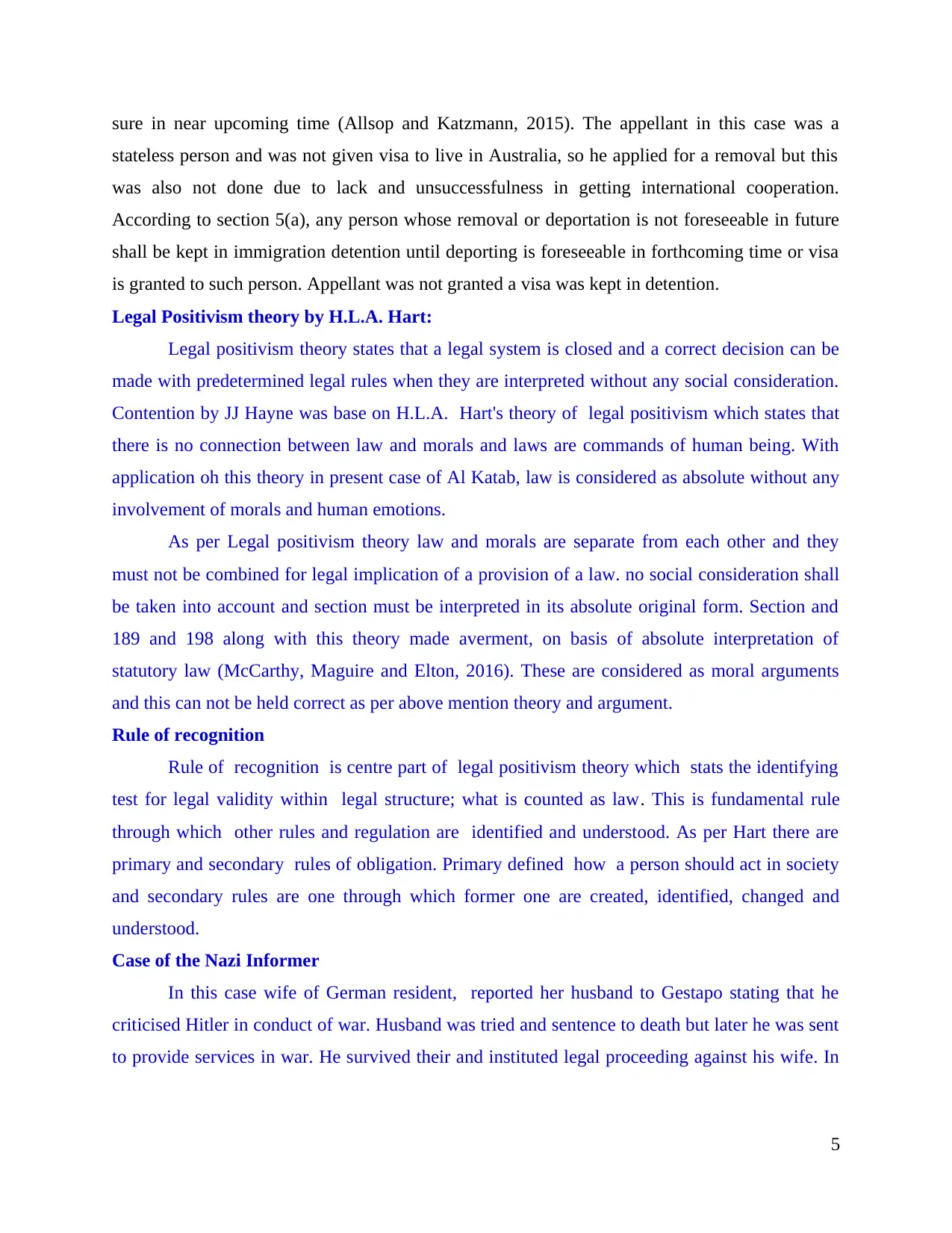
sure in near upcoming time (Allsop and Katzmann, 2015). The appellant in this case was a
stateless person and was not given visa to live in Australia, so he applied for a removal but this
was also not done due to lack and unsuccessfulness in getting international cooperation.
According to section 5(a), any person whose removal or deportation is not foreseeable in future
shall be kept in immigration detention until deporting is foreseeable in forthcoming time or visa
is granted to such person. Appellant was not granted a visa was kept in detention.
Legal Positivism theory by H.L.A. Hart:
Legal positivism theory states that a legal system is closed and a correct decision can be
made with predetermined legal rules when they are interpreted without any social consideration.
Contention by JJ Hayne was base on H.L.A. Hart's theory of legal positivism which states that
there is no connection between law and morals and laws are commands of human being. With
application oh this theory in present case of Al Katab, law is considered as absolute without any
involvement of morals and human emotions.
As per Legal positivism theory law and morals are separate from each other and they
must not be combined for legal implication of a provision of a law. no social consideration shall
be taken into account and section must be interpreted in its absolute original form. Section and
189 and 198 along with this theory made averment, on basis of absolute interpretation of
statutory law (McCarthy, Maguire and Elton, 2016). These are considered as moral arguments
and this can not be held correct as per above mention theory and argument.
Rule of recognition
Rule of recognition is centre part of legal positivism theory which stats the identifying
test for legal validity within legal structure; what is counted as law. This is fundamental rule
through which other rules and regulation are identified and understood. As per Hart there are
primary and secondary rules of obligation. Primary defined how a person should act in society
and secondary rules are one through which former one are created, identified, changed and
understood.
Case of the Nazi Informer
In this case wife of German resident, reported her husband to Gestapo stating that he
criticised Hitler in conduct of war. Husband was tried and sentence to death but later he was sent
to provide services in war. He survived their and instituted legal proceeding against his wife. In
5
stateless person and was not given visa to live in Australia, so he applied for a removal but this
was also not done due to lack and unsuccessfulness in getting international cooperation.
According to section 5(a), any person whose removal or deportation is not foreseeable in future
shall be kept in immigration detention until deporting is foreseeable in forthcoming time or visa
is granted to such person. Appellant was not granted a visa was kept in detention.
Legal Positivism theory by H.L.A. Hart:
Legal positivism theory states that a legal system is closed and a correct decision can be
made with predetermined legal rules when they are interpreted without any social consideration.
Contention by JJ Hayne was base on H.L.A. Hart's theory of legal positivism which states that
there is no connection between law and morals and laws are commands of human being. With
application oh this theory in present case of Al Katab, law is considered as absolute without any
involvement of morals and human emotions.
As per Legal positivism theory law and morals are separate from each other and they
must not be combined for legal implication of a provision of a law. no social consideration shall
be taken into account and section must be interpreted in its absolute original form. Section and
189 and 198 along with this theory made averment, on basis of absolute interpretation of
statutory law (McCarthy, Maguire and Elton, 2016). These are considered as moral arguments
and this can not be held correct as per above mention theory and argument.
Rule of recognition
Rule of recognition is centre part of legal positivism theory which stats the identifying
test for legal validity within legal structure; what is counted as law. This is fundamental rule
through which other rules and regulation are identified and understood. As per Hart there are
primary and secondary rules of obligation. Primary defined how a person should act in society
and secondary rules are one through which former one are created, identified, changed and
understood.
Case of the Nazi Informer
In this case wife of German resident, reported her husband to Gestapo stating that he
criticised Hitler in conduct of war. Husband was tried and sentence to death but later he was sent
to provide services in war. He survived their and instituted legal proceeding against his wife. In
5
Paraphrase This Document
Need a fresh take? Get an instant paraphrase of this document with our AI Paraphraser
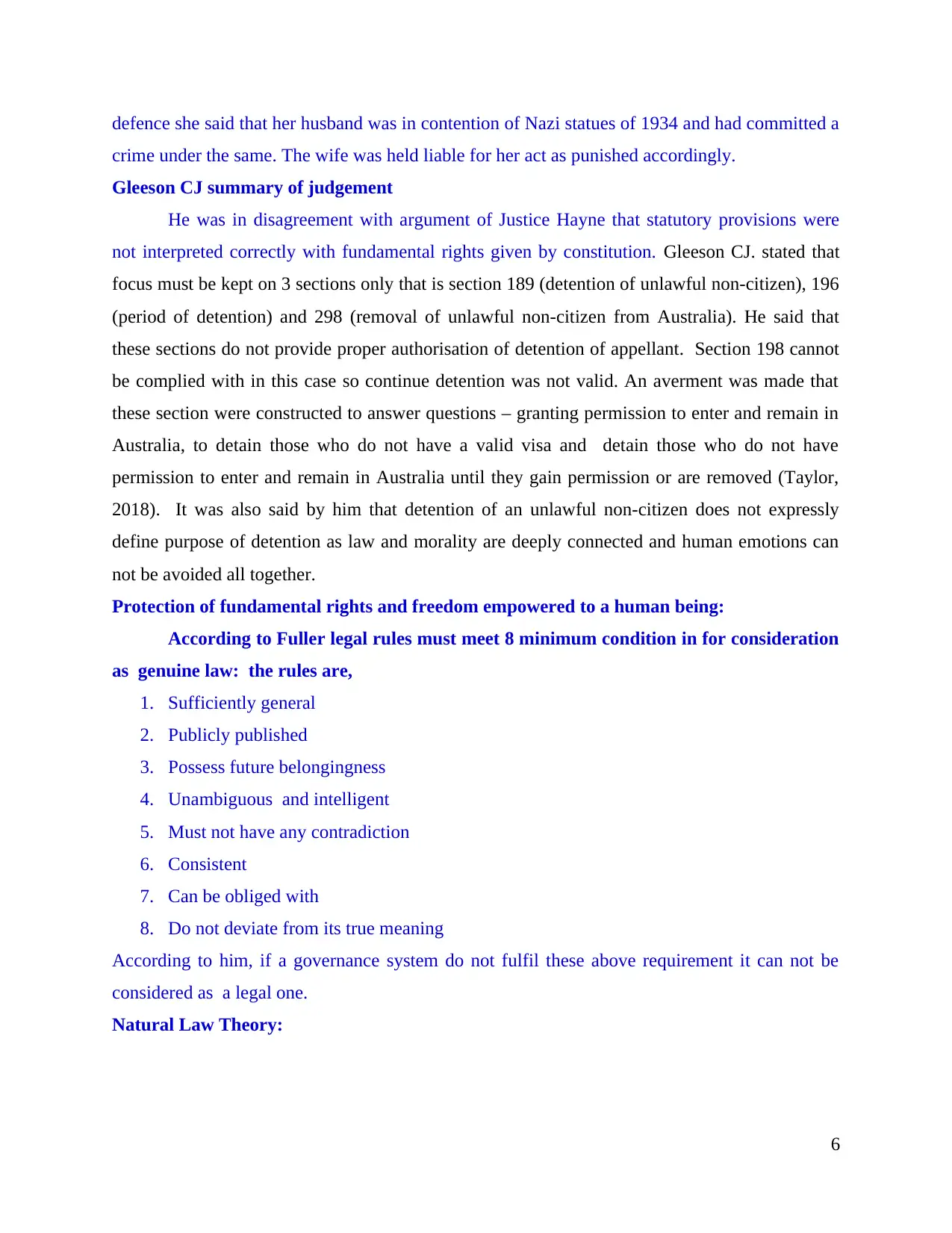
defence she said that her husband was in contention of Nazi statues of 1934 and had committed a
crime under the same. The wife was held liable for her act as punished accordingly.
Gleeson CJ summary of judgement
He was in disagreement with argument of Justice Hayne that statutory provisions were
not interpreted correctly with fundamental rights given by constitution. Gleeson CJ. stated that
focus must be kept on 3 sections only that is section 189 (detention of unlawful non-citizen), 196
(period of detention) and 298 (removal of unlawful non-citizen from Australia). He said that
these sections do not provide proper authorisation of detention of appellant. Section 198 cannot
be complied with in this case so continue detention was not valid. An averment was made that
these section were constructed to answer questions – granting permission to enter and remain in
Australia, to detain those who do not have a valid visa and detain those who do not have
permission to enter and remain in Australia until they gain permission or are removed (Taylor,
2018). It was also said by him that detention of an unlawful non-citizen does not expressly
define purpose of detention as law and morality are deeply connected and human emotions can
not be avoided all together.
Protection of fundamental rights and freedom empowered to a human being:
According to Fuller legal rules must meet 8 minimum condition in for consideration
as genuine law: the rules are,
1. Sufficiently general
2. Publicly published
3. Possess future belongingness
4. Unambiguous and intelligent
5. Must not have any contradiction
6. Consistent
7. Can be obliged with
8. Do not deviate from its true meaning
According to him, if a governance system do not fulfil these above requirement it can not be
considered as a legal one.
Natural Law Theory:
6
crime under the same. The wife was held liable for her act as punished accordingly.
Gleeson CJ summary of judgement
He was in disagreement with argument of Justice Hayne that statutory provisions were
not interpreted correctly with fundamental rights given by constitution. Gleeson CJ. stated that
focus must be kept on 3 sections only that is section 189 (detention of unlawful non-citizen), 196
(period of detention) and 298 (removal of unlawful non-citizen from Australia). He said that
these sections do not provide proper authorisation of detention of appellant. Section 198 cannot
be complied with in this case so continue detention was not valid. An averment was made that
these section were constructed to answer questions – granting permission to enter and remain in
Australia, to detain those who do not have a valid visa and detain those who do not have
permission to enter and remain in Australia until they gain permission or are removed (Taylor,
2018). It was also said by him that detention of an unlawful non-citizen does not expressly
define purpose of detention as law and morality are deeply connected and human emotions can
not be avoided all together.
Protection of fundamental rights and freedom empowered to a human being:
According to Fuller legal rules must meet 8 minimum condition in for consideration
as genuine law: the rules are,
1. Sufficiently general
2. Publicly published
3. Possess future belongingness
4. Unambiguous and intelligent
5. Must not have any contradiction
6. Consistent
7. Can be obliged with
8. Do not deviate from its true meaning
According to him, if a governance system do not fulfil these above requirement it can not be
considered as a legal one.
Natural Law Theory:
6
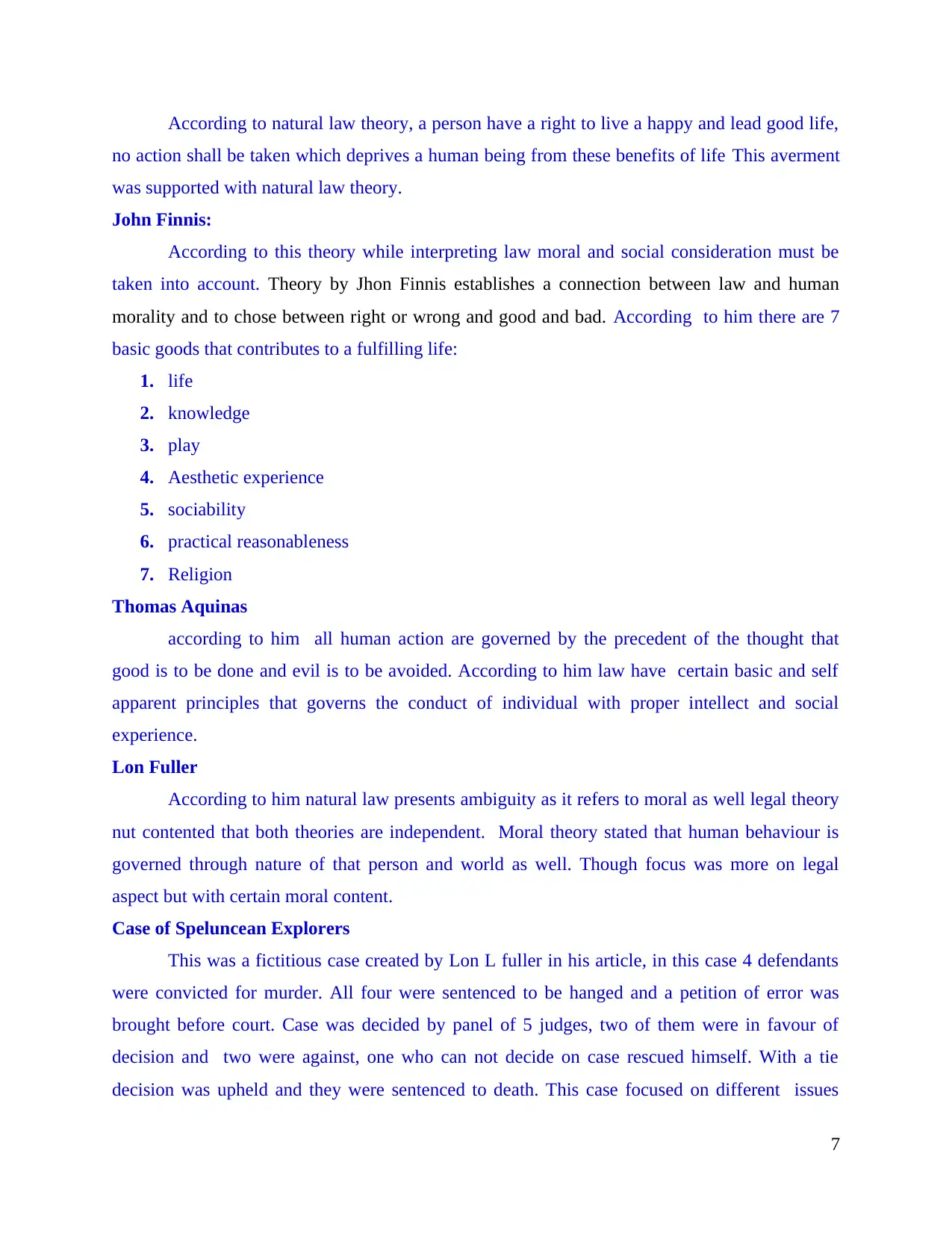
According to natural law theory, a person have a right to live a happy and lead good life,
no action shall be taken which deprives a human being from these benefits of life This averment
was supported with natural law theory.
John Finnis:
According to this theory while interpreting law moral and social consideration must be
taken into account. Theory by Jhon Finnis establishes a connection between law and human
morality and to chose between right or wrong and good and bad. According to him there are 7
basic goods that contributes to a fulfilling life:
1. life
2. knowledge
3. play
4. Aesthetic experience
5. sociability
6. practical reasonableness
7. Religion
Thomas Aquinas
according to him all human action are governed by the precedent of the thought that
good is to be done and evil is to be avoided. According to him law have certain basic and self
apparent principles that governs the conduct of individual with proper intellect and social
experience.
Lon Fuller
According to him natural law presents ambiguity as it refers to moral as well legal theory
nut contented that both theories are independent. Moral theory stated that human behaviour is
governed through nature of that person and world as well. Though focus was more on legal
aspect but with certain moral content.
Case of Speluncean Explorers
This was a fictitious case created by Lon L fuller in his article, in this case 4 defendants
were convicted for murder. All four were sentenced to be hanged and a petition of error was
brought before court. Case was decided by panel of 5 judges, two of them were in favour of
decision and two were against, one who can not decide on case rescued himself. With a tie
decision was upheld and they were sentenced to death. This case focused on different issues
7
no action shall be taken which deprives a human being from these benefits of life This averment
was supported with natural law theory.
John Finnis:
According to this theory while interpreting law moral and social consideration must be
taken into account. Theory by Jhon Finnis establishes a connection between law and human
morality and to chose between right or wrong and good and bad. According to him there are 7
basic goods that contributes to a fulfilling life:
1. life
2. knowledge
3. play
4. Aesthetic experience
5. sociability
6. practical reasonableness
7. Religion
Thomas Aquinas
according to him all human action are governed by the precedent of the thought that
good is to be done and evil is to be avoided. According to him law have certain basic and self
apparent principles that governs the conduct of individual with proper intellect and social
experience.
Lon Fuller
According to him natural law presents ambiguity as it refers to moral as well legal theory
nut contented that both theories are independent. Moral theory stated that human behaviour is
governed through nature of that person and world as well. Though focus was more on legal
aspect but with certain moral content.
Case of Speluncean Explorers
This was a fictitious case created by Lon L fuller in his article, in this case 4 defendants
were convicted for murder. All four were sentenced to be hanged and a petition of error was
brought before court. Case was decided by panel of 5 judges, two of them were in favour of
decision and two were against, one who can not decide on case rescued himself. With a tie
decision was upheld and they were sentenced to death. This case focused on different issues
7
⊘ This is a preview!⊘
Do you want full access?
Subscribe today to unlock all pages.

Trusted by 1+ million students worldwide
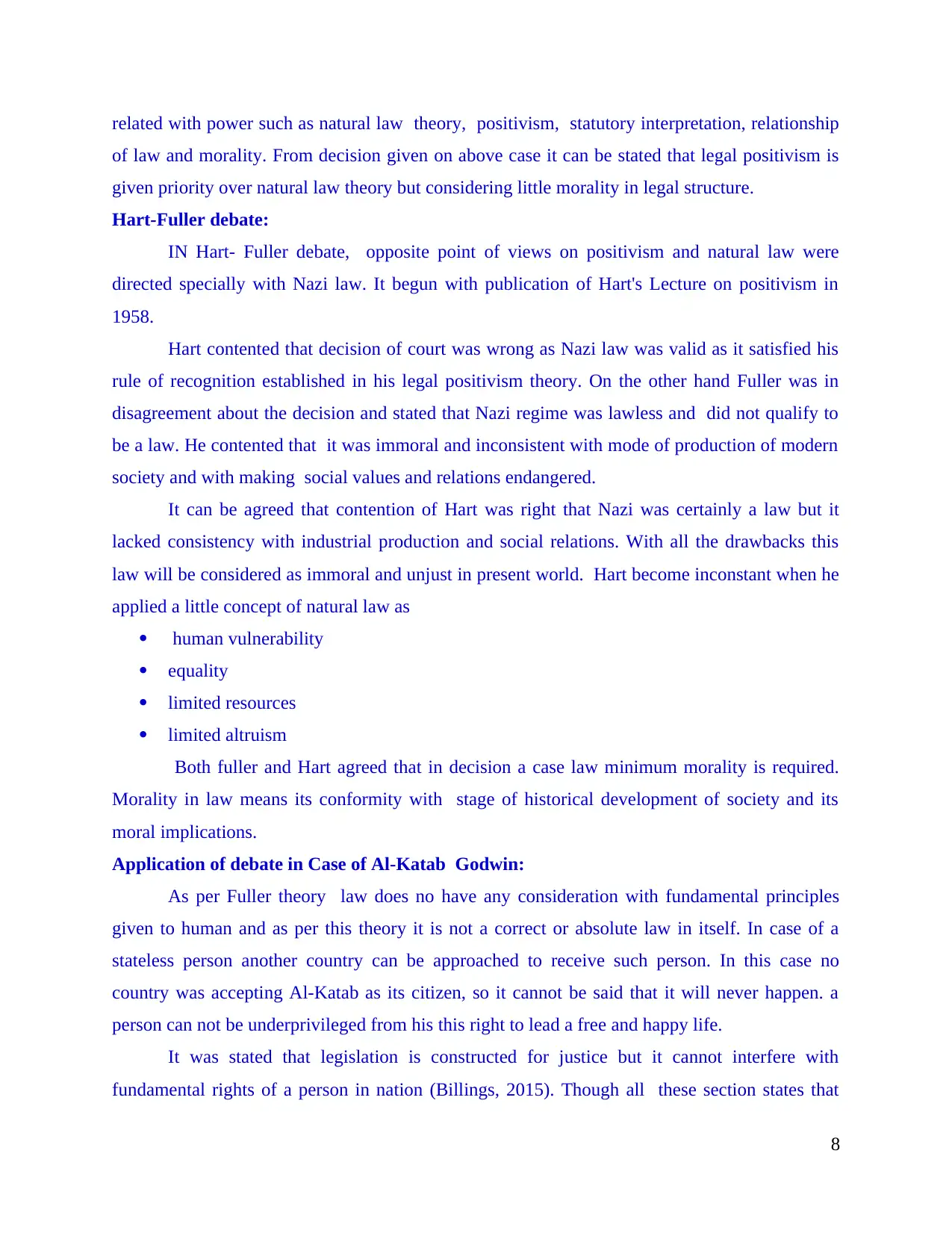
related with power such as natural law theory, positivism, statutory interpretation, relationship
of law and morality. From decision given on above case it can be stated that legal positivism is
given priority over natural law theory but considering little morality in legal structure.
Hart-Fuller debate:
IN Hart- Fuller debate, opposite point of views on positivism and natural law were
directed specially with Nazi law. It begun with publication of Hart's Lecture on positivism in
1958.
Hart contented that decision of court was wrong as Nazi law was valid as it satisfied his
rule of recognition established in his legal positivism theory. On the other hand Fuller was in
disagreement about the decision and stated that Nazi regime was lawless and did not qualify to
be a law. He contented that it was immoral and inconsistent with mode of production of modern
society and with making social values and relations endangered.
It can be agreed that contention of Hart was right that Nazi was certainly a law but it
lacked consistency with industrial production and social relations. With all the drawbacks this
law will be considered as immoral and unjust in present world. Hart become inconstant when he
applied a little concept of natural law as
human vulnerability
equality
limited resources
limited altruism
Both fuller and Hart agreed that in decision a case law minimum morality is required.
Morality in law means its conformity with stage of historical development of society and its
moral implications.
Application of debate in Case of Al-Katab Godwin:
As per Fuller theory law does no have any consideration with fundamental principles
given to human and as per this theory it is not a correct or absolute law in itself. In case of a
stateless person another country can be approached to receive such person. In this case no
country was accepting Al-Katab as its citizen, so it cannot be said that it will never happen. a
person can not be underprivileged from his this right to lead a free and happy life.
It was stated that legislation is constructed for justice but it cannot interfere with
fundamental rights of a person in nation (Billings, 2015). Though all these section states that
8
of law and morality. From decision given on above case it can be stated that legal positivism is
given priority over natural law theory but considering little morality in legal structure.
Hart-Fuller debate:
IN Hart- Fuller debate, opposite point of views on positivism and natural law were
directed specially with Nazi law. It begun with publication of Hart's Lecture on positivism in
1958.
Hart contented that decision of court was wrong as Nazi law was valid as it satisfied his
rule of recognition established in his legal positivism theory. On the other hand Fuller was in
disagreement about the decision and stated that Nazi regime was lawless and did not qualify to
be a law. He contented that it was immoral and inconsistent with mode of production of modern
society and with making social values and relations endangered.
It can be agreed that contention of Hart was right that Nazi was certainly a law but it
lacked consistency with industrial production and social relations. With all the drawbacks this
law will be considered as immoral and unjust in present world. Hart become inconstant when he
applied a little concept of natural law as
human vulnerability
equality
limited resources
limited altruism
Both fuller and Hart agreed that in decision a case law minimum morality is required.
Morality in law means its conformity with stage of historical development of society and its
moral implications.
Application of debate in Case of Al-Katab Godwin:
As per Fuller theory law does no have any consideration with fundamental principles
given to human and as per this theory it is not a correct or absolute law in itself. In case of a
stateless person another country can be approached to receive such person. In this case no
country was accepting Al-Katab as its citizen, so it cannot be said that it will never happen. a
person can not be underprivileged from his this right to lead a free and happy life.
It was stated that legislation is constructed for justice but it cannot interfere with
fundamental rights of a person in nation (Billings, 2015). Though all these section states that
8
Paraphrase This Document
Need a fresh take? Get an instant paraphrase of this document with our AI Paraphraser
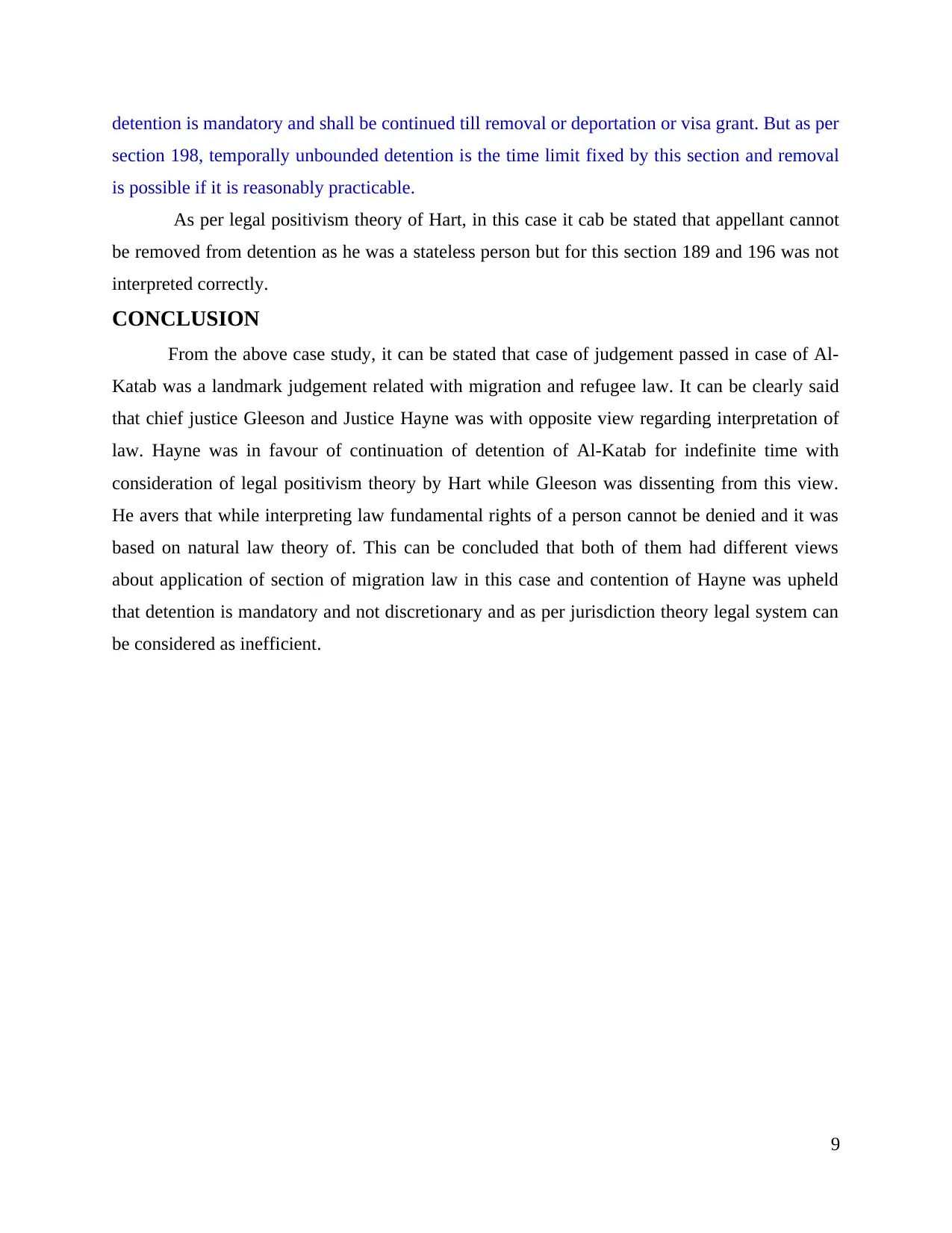
detention is mandatory and shall be continued till removal or deportation or visa grant. But as per
section 198, temporally unbounded detention is the time limit fixed by this section and removal
is possible if it is reasonably practicable.
As per legal positivism theory of Hart, in this case it cab be stated that appellant cannot
be removed from detention as he was a stateless person but for this section 189 and 196 was not
interpreted correctly.
CONCLUSION
From the above case study, it can be stated that case of judgement passed in case of Al-
Katab was a landmark judgement related with migration and refugee law. It can be clearly said
that chief justice Gleeson and Justice Hayne was with opposite view regarding interpretation of
law. Hayne was in favour of continuation of detention of Al-Katab for indefinite time with
consideration of legal positivism theory by Hart while Gleeson was dissenting from this view.
He avers that while interpreting law fundamental rights of a person cannot be denied and it was
based on natural law theory of. This can be concluded that both of them had different views
about application of section of migration law in this case and contention of Hayne was upheld
that detention is mandatory and not discretionary and as per jurisdiction theory legal system can
be considered as inefficient.
9
section 198, temporally unbounded detention is the time limit fixed by this section and removal
is possible if it is reasonably practicable.
As per legal positivism theory of Hart, in this case it cab be stated that appellant cannot
be removed from detention as he was a stateless person but for this section 189 and 196 was not
interpreted correctly.
CONCLUSION
From the above case study, it can be stated that case of judgement passed in case of Al-
Katab was a landmark judgement related with migration and refugee law. It can be clearly said
that chief justice Gleeson and Justice Hayne was with opposite view regarding interpretation of
law. Hayne was in favour of continuation of detention of Al-Katab for indefinite time with
consideration of legal positivism theory by Hart while Gleeson was dissenting from this view.
He avers that while interpreting law fundamental rights of a person cannot be denied and it was
based on natural law theory of. This can be concluded that both of them had different views
about application of section of migration law in this case and contention of Hayne was upheld
that detention is mandatory and not discretionary and as per jurisdiction theory legal system can
be considered as inefficient.
9
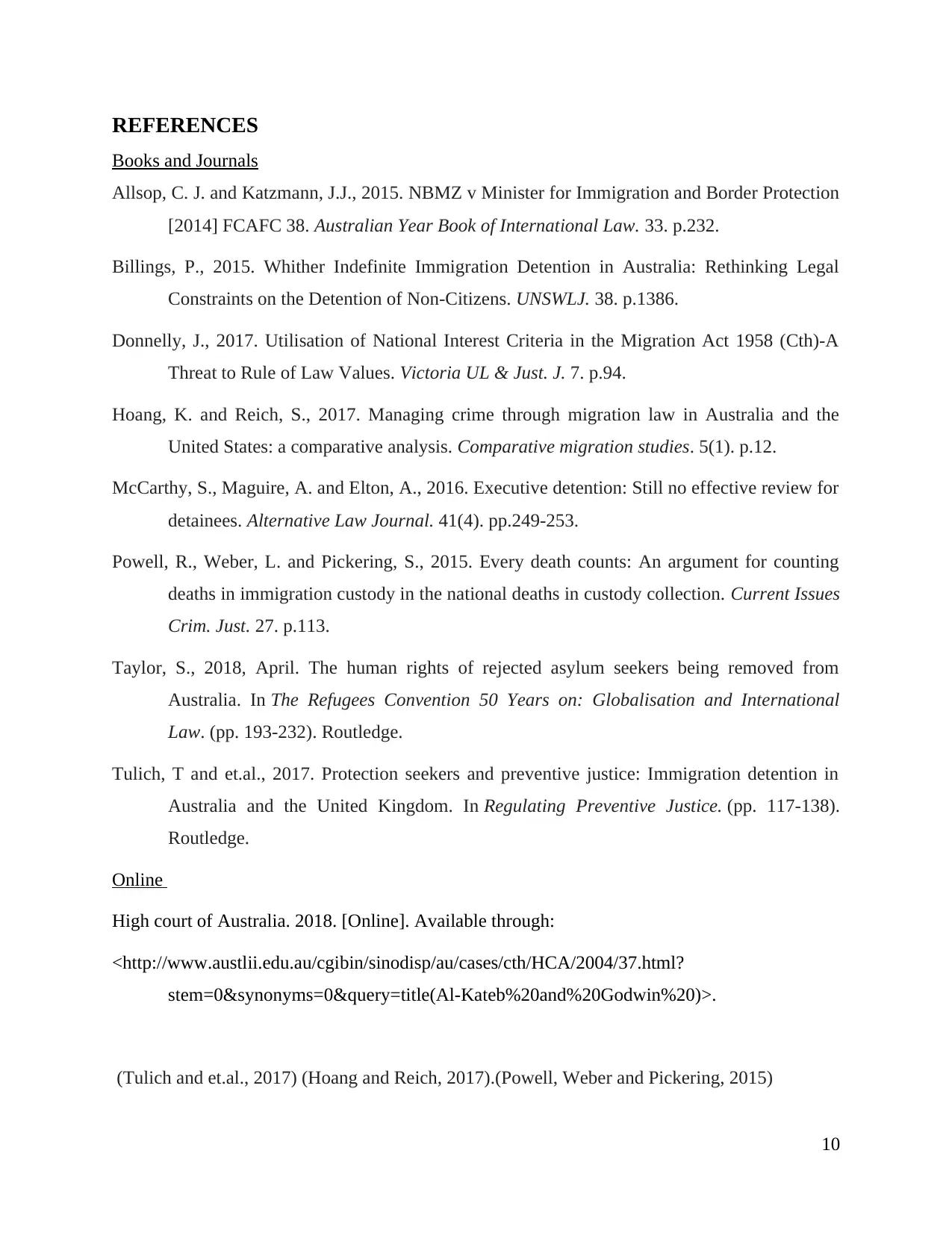
REFERENCES
Books and Journals
Allsop, C. J. and Katzmann, J.J., 2015. NBMZ v Minister for Immigration and Border Protection
[2014] FCAFC 38. Australian Year Book of International Law. 33. p.232.
Billings, P., 2015. Whither Indefinite Immigration Detention in Australia: Rethinking Legal
Constraints on the Detention of Non-Citizens. UNSWLJ. 38. p.1386.
Donnelly, J., 2017. Utilisation of National Interest Criteria in the Migration Act 1958 (Cth)-A
Threat to Rule of Law Values. Victoria UL & Just. J. 7. p.94.
Hoang, K. and Reich, S., 2017. Managing crime through migration law in Australia and the
United States: a comparative analysis. Comparative migration studies. 5(1). p.12.
McCarthy, S., Maguire, A. and Elton, A., 2016. Executive detention: Still no effective review for
detainees. Alternative Law Journal. 41(4). pp.249-253.
Powell, R., Weber, L. and Pickering, S., 2015. Every death counts: An argument for counting
deaths in immigration custody in the national deaths in custody collection. Current Issues
Crim. Just. 27. p.113.
Taylor, S., 2018, April. The human rights of rejected asylum seekers being removed from
Australia. In The Refugees Convention 50 Years on: Globalisation and International
Law. (pp. 193-232). Routledge.
Tulich, T and et.al., 2017. Protection seekers and preventive justice: Immigration detention in
Australia and the United Kingdom. In Regulating Preventive Justice. (pp. 117-138).
Routledge.
Online
High court of Australia. 2018. [Online]. Available through:
<http://www.austlii.edu.au/cgibin/sinodisp/au/cases/cth/HCA/2004/37.html?
stem=0&synonyms=0&query=title(Al-Kateb%20and%20Godwin%20)>.
(Tulich and et.al., 2017) (Hoang and Reich, 2017).(Powell, Weber and Pickering, 2015)
10
Books and Journals
Allsop, C. J. and Katzmann, J.J., 2015. NBMZ v Minister for Immigration and Border Protection
[2014] FCAFC 38. Australian Year Book of International Law. 33. p.232.
Billings, P., 2015. Whither Indefinite Immigration Detention in Australia: Rethinking Legal
Constraints on the Detention of Non-Citizens. UNSWLJ. 38. p.1386.
Donnelly, J., 2017. Utilisation of National Interest Criteria in the Migration Act 1958 (Cth)-A
Threat to Rule of Law Values. Victoria UL & Just. J. 7. p.94.
Hoang, K. and Reich, S., 2017. Managing crime through migration law in Australia and the
United States: a comparative analysis. Comparative migration studies. 5(1). p.12.
McCarthy, S., Maguire, A. and Elton, A., 2016. Executive detention: Still no effective review for
detainees. Alternative Law Journal. 41(4). pp.249-253.
Powell, R., Weber, L. and Pickering, S., 2015. Every death counts: An argument for counting
deaths in immigration custody in the national deaths in custody collection. Current Issues
Crim. Just. 27. p.113.
Taylor, S., 2018, April. The human rights of rejected asylum seekers being removed from
Australia. In The Refugees Convention 50 Years on: Globalisation and International
Law. (pp. 193-232). Routledge.
Tulich, T and et.al., 2017. Protection seekers and preventive justice: Immigration detention in
Australia and the United Kingdom. In Regulating Preventive Justice. (pp. 117-138).
Routledge.
Online
High court of Australia. 2018. [Online]. Available through:
<http://www.austlii.edu.au/cgibin/sinodisp/au/cases/cth/HCA/2004/37.html?
stem=0&synonyms=0&query=title(Al-Kateb%20and%20Godwin%20)>.
(Tulich and et.al., 2017) (Hoang and Reich, 2017).(Powell, Weber and Pickering, 2015)
10
⊘ This is a preview!⊘
Do you want full access?
Subscribe today to unlock all pages.

Trusted by 1+ million students worldwide
1 out of 13
Related Documents
Your All-in-One AI-Powered Toolkit for Academic Success.
+13062052269
info@desklib.com
Available 24*7 on WhatsApp / Email
![[object Object]](/_next/static/media/star-bottom.7253800d.svg)
Unlock your academic potential
Copyright © 2020–2026 A2Z Services. All Rights Reserved. Developed and managed by ZUCOL.





